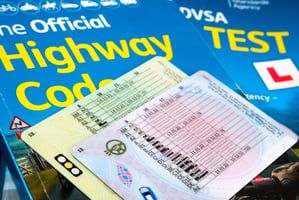When we’re learning to drive (or refreshing our knowledge of the rules of the road) it’s important...
Have you ever wondered if there are any changes to the driving rules in the UK when you hit seventy? There are indeed a couple of things to be aware of, and also potentially some changes in the pipeline, so let’s take a look at this topic below…
Your driving licence…
There’s a driving licence change that kicks in when your 70th birthday is either here or looming, so let’s take a look at what it is…
If you are under 70, you need to renew your photocard licence every 10 years, but if you are over 70, you must now renew it every 3 years instead.
The DVLA will automatically send you a form 90 days before your 70th birthday to remind you to renew your licence.
This can usually be done online, however you can also apply by post using the D46P application form, which you can pick up from the Post Office. If you are renewing a C1 (medium-sized vehicles) or D1 (minibus) licence you will need to do it solely by post rather than online, however. If you need to change any entitlements, you can have a look at the different driving categories here and see which one applies to you.

Is there an upper age for driving?
There is currently no upper age limit for driving, but it's crucial to ensure you have continuing fitness to drive, and that you renew your licence on time. If a medical condition affects your driving ability - such as a previous health condition that has worsened, or a new one - you do need to inform the DVLA. Your safety and the safety of other road users is the most important thing to consider.
If you’re concerned that your driving is not as good as it was, and that you may be putting yourself or other road users at risk - stop before you have an accident.
It’s vital to remember that if you’re involved in an accident where your health condition may have been a reason for the accident occurring, you could be prosecuted, and your insurance also may not cover you.

What should we potentially consider about our driving as we get older?
It’s good to have a think about whether your reactions are noticeably slower than they used to be, or if you find traffic conditions increasingly stressful. If you have a health condition that you think might impact your driving but you’re not sure, you can ask your GP for their help. Additionally, if you notice that your eyesight is getting worse, it’s worth popping to the opticians to get some advice. There are some eyesight rules for driving which you can find here.
And finally, what’s new?
Well, it looks like the government is planning to change parts of the law relating to driving, as in early August of 2025 it set out its proposals for a new road safety plan to be published in the autumn, to potentially include banning drivers over 70 who fail compulsory eye tests.
This follows an inquest into four deaths that were caused by drivers with failing eyesight, whereby the coroner said the UK’s licensing system was the laxest in Europe. Dr James Adeley sent a letter to the Transport Secretary, Heidi Alexander, to say action should be taken to prevent future deaths, after he found that the current enforcement of visual legal standards for drivers was unsafe.
The UK is one of only three countries in Europe that allow drivers to self-report any eye conditions that may affect the individual’s ability to drive. It appears now that the government is considering making eye tests compulsory with every three year licence renewal.
We will keep you updated on that one, when the currently-named Road Safety Strategy is released later this year.

Hopefully you’ve found that helpful!
Safe driving!
Disclaimer: This is for information only. We’ve taken every care to ensure that the information within this article is correct, but please make sure to keep up to date with the legislation and guidance on these topics as things could change.







